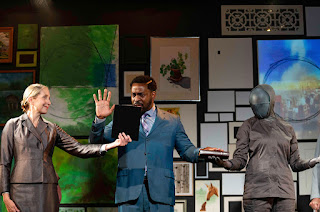By Ruth Ross
Present in our daily lives in myriad ways of which we are
unaware, AI—artificial intelligence—has been much in the news lately, from a
program that can generate an essay to one that can “read” text on ancient
scrolls that cannot be unrolled. Even more ubiquitous is the algorithm that targets
you with ads on Facebook or that anticipates your search terms on Google.
Thus, AI could be a timely and potent subject for the
theater. Indeed, Helen Banner has done just that in a drama entitled Westphalia,
now receiving its World Premiere at Luna Stage. However, she takes it a bit
farther than the mostly benign uses for AI by setting her play in “a parallel
United States in 2027,” as noted in the playbill, where humanoids provide
professional and emotional support to a corporation paying Americans millions
to renounce their U.S. citizenship.
While the concept seems intriguing, what should be the
centerpiece of the story, the AI humanoid, is reduced to just another element
in Banner’s stew of assorted subjects—immigration; gentrification and its
partner, income inequality; racism; ableism—a gimmick the play could do without.
The plot involves the Robert family—father Edward and his two interracial adult kids, Kris and Sandy. Faced with mounting debts on the Westphalia, Connecticut, land that has been in his family for centuries, Edward has allowed his daughter to talk him into selling his American citizenship to CIT-Ex, a corporation based in Jersey City, led by a very officious, brittle woman named Leandra Brown, assisted by a humanoid robot named Kultur 1. Evidently, Sandra and Kris, both middle school teachers, are unhappy with their country and seek to leave, although neither has any idea where they emigrate with the $2+ million they’ll get from the sale. Just as they are about to complete the deal and publicly renounce their U.S. citizenship, a “stop order” executed by their neighbor and a local judge upends their plans, leaving the family to find other ways to raise money to solve their financial problems. (L-R: Sydney Lo, Steven Hauck and Neil Dawkins)
That’s the bare bones of the story; there’s a lot of
other stuff about Kultur 1 feeling neglected by Leandra, who is supposed to
train it by talking to it daily; the robot’s role in vetting applicants for
CIT-Ex and psychologically supporting Leandra; citizenship’s becoming a
capitalist commodity; and Kultur 1’s evolution into an ethical machine. These digressions
come fast and furious and are an ultimately dizzying soup of unrelated ideas.
Director Lila Rachel Becker has worked mightily to link these concepts, but the show still clocks in at close to two hours. Both Steven Hauck, playing a desperate Edward Robert and snooty judge Tom Danforth, and Laura Jordan, as driven executive Leandra Brown and Edward’s condescending neighbor Abigail Weston, are terrific in their disparate dual roles. However, Neil Dawkins as Kris Robert and Sydney Lo as his sister Sandy fare less well. Neither delivers dialogue that feels convincing or natural; both utter lines written for them, not by them. Indeed, when Sandy is having a telephone conversation, Lo speaks so quickly that the person on the other end couldn’t have uttered a complete reply. Perhaps Banner has given them roles that are unbelievable and/or undeveloped, so the two had little to work with, but it affects our acceptance of the rather outlandish situation. I never for one minute believed their so-called reasons for wanting to renounce their citizenship. Phoebe Lloyd (above) does a magnificent job as Kultur 1, walking robotically and speaking in what feels like an unemotional voice produced by a machine.
The complex set is very distracting too. Patricia Marjorie’s
design transports us to a corporation lobby, a cozy living room and the German
plant that manufactured Kultur 1. Artwork on the rear wall of the playing space
is supposedly that produced by Kris, a talented artist, although it’s not very
good; Americana on the left wall signifies the Robert family’s Pilgrim roots;
Wesphalia’s upscale residents are drolly depicted by the “horses” ridden by
Abigail and Judge Tom Danforth. Courtney Gaston’s lighting and projection
design further enhance the various settings. Joshua Dumas’ sound design
includes music that sounds like a computer running programs. And Deborah Caney’s
costumes define each character’s social position and personality, especially
the purple head-to-toe costume worn by Kultur 1, complete with a mask
completely covering Lloyd’s face; the matching purple suit worn by Leandra; and
the riding togs worn by Abigail and Tom.
I have always lauded Luna Stage for the risks they take
mounting new plays, but this production fails to match their previous efforts. The
effect of AI on our lives is a growing concern, but if Westphalia was
supposed to warn us of its dangers, the attempt falls flat. Kultur 1 isn’t as
menacing as Leandra Brown or Abigail Weston, two manipulative women out for no
one but themselves.
Perhaps with some work, Westphalia will become a
viable work of art. For now, it’s a hodge-podge of ideas that never gels into a
coherent critique of what’s wrong with our society. Banner bit off more than
she could chew to the detriment of what could have been a thought-provoking
study.
Oh, and a note about the title: The 1648 Treaty of Westphalia
ended decades-long wars in Europe and articulated the concept of territorial
sovereignty and the need for formal documents to travel from country to country,
a theme tied to the role immigration reform and national borders play in the
plot.
Westphalia will be performed at
Luna Stage, 555 Valley Road, West Orange, weekends through November 12. For
tickets and information, call the box office at 973.395.5551 or visit www.lunastage.org.


